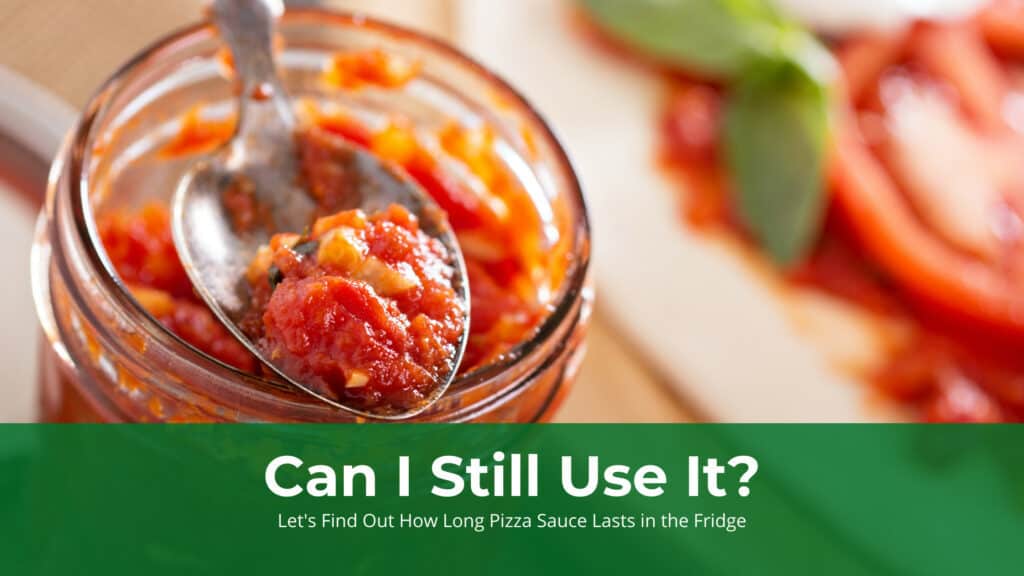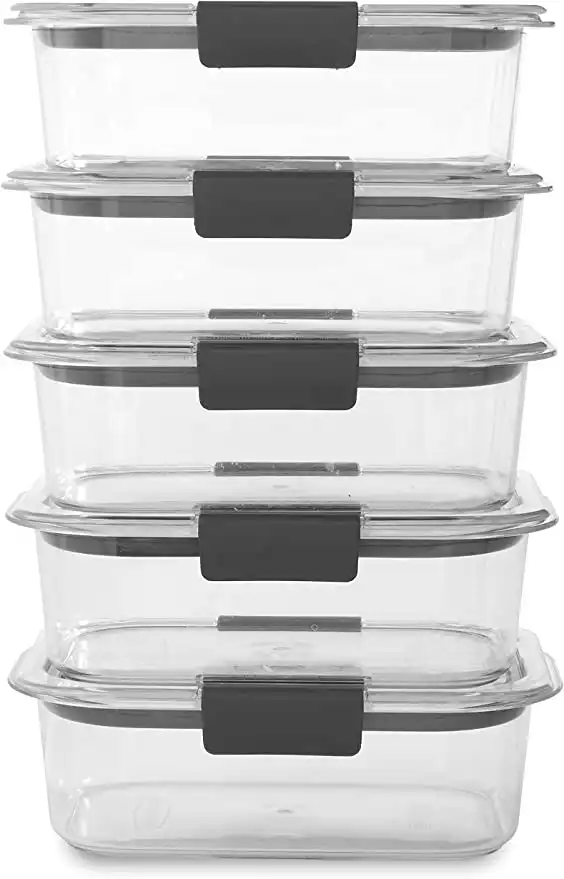How often have you peered into the fridge, squinting at a pizza sauce jar and pondering the timeless question: “Is this still good?” We’ve all been there—shouldering the mantle of a culinary detective, our taste buds held hostage by an unmarked, half-used jar of saucy mystery. The trail of crusty breadcrumbs left by your last late-night pizza-making adventure has gone cold. Is the sauce a treasured relic of a pizza well-made, or a ticking time bomb of culinary disaster?
Are you tired of playing Russian Roulette with your pizza sauce? Worry no more, for you’ve embarked upon a saucy journey that will lead you to the truth. This post is your definitive guide to understanding the lifespan of pizza sauce in the refrigerator—no more guessing or risking your favorite topping to the whims of uncertainty.
Crack open the fridge and pull out that jar—it’s time to delve into the world of tomatoes, herbs, and shelf life. Let’s uncover the secrets, the science, and the art of preserving that tangy delight we all love, the pizza sauce.
So, buckle up your apron, and let’s answer the burning question: just how long does pizza sauce last in the fridge?
Read on, fellow pizza aficionados, read on…
Let’s find out!
Here’s What You Will Find:
Key Takeaways
How Long Does Pizza Last in the Fridge?
Store-bought vs. Homemade: Thanks to its preservatives, store-bought pizza sauce can last up to a year unopened in the pantry and around 4-14 days in the fridge once opened. Homemade sauce, being preservative-free, lasts about a week in the fridge, whether it’s opened or not.
Storage is Key: Always refrigerate your pizza sauce after opening. A cool, steady temperature slows bacterial growth, preserving your sauce for longer. Your fridge should ideally be set at or below 40°F (4°C).
Minimize Air Exposure: When you open the jar, new air and bacteria enter. To extend the shelf life of your sauce, retrieve what you need quickly and seal the jar promptly.
Choose the Right Container: Glass jars with airtight lids are the best for storing pizza sauce. They don’t absorb flavors or odors and can be cleaned thoroughly. If you opt for plastic, ensure it’s in good condition and washed properly.
Understanding Pizza Sauce
Before we delve into the nitty-gritty of pizza sauce preservation, it’s essential to understand what goes into this tangy concoction. Pizza sauce is a simple yet flavorful mixture typically comprising tomatoes, garlic, herbs, onions, and sometimes a splash of olive oil. The magic lies in the combination, but let’s break it down to see how each ingredient fares over time.
Tomatoes, the heart and soul of pizza sauce are perishable and will begin to lose their vibrancy and taste after a week or so in the fridge. Garlic and onions have a similar lifespan, though their flavors may become stronger before degrade.
Herbs, be they fresh or dried, are more variable. Fresh herbs can wilt within a week, while dried herbs can retain their flavor for years. The olive oil, if used, can last months if properly stored but can start to become rancid after this time.
Homemade vs Store Bought Pizza Sauce
Now, let’s discuss the difference between homemade and store-bought pizza sauce. Homemade pizza sauce is a fresh, preservative-free mixture. This lack of preservatives means it will generally last for about a week in the refrigerator, given that the ingredients are fresh to start with.
On the other hand, store-bought pizza sauce often contains preservatives such as citric acid and sodium benzoate. These preservatives are added to extend the sauce’s shelf life and maintain its flavor and color over time. As a result, an unopened jar of store-bought pizza sauce can last for a year or more in the pantry, and once opened, it will usually stay good for at least two weeks in the fridge.
However, it’s crucial to remember that these timelines are estimations. The actual shelf life can vary based on factors like the specific ingredients used, the cleanliness of your utensils and containers, and the temperature of your refrigerator. In the upcoming sections, we’ll dive deeper into these variables and how to manage them for maximum pizza sauce longevity.
How Long Does Pizza Sauce Last In The Fridge?
Always remember that not all bad things stink. Pizza sauce remains at its best for four days in the fridge between 35 and 40 degrees Fahrenheit. Storing the pizza sauce for more than 3-5 days is pointless. It will only degrade its quality.
The short answer is that pizza sauce can last around four days in the fridge. But this is about the store-bought sauce. What about homemade pizza sauce? Will it get spoiled in the fridge? Don’t worry; we will answer all of the questions.
How Long Does Unopened Pizza Sauce Last
The phrase “sealed for freshness” rings especially true regarding the shelf-life of unopened pizza sauce. However, the longevity of your pizza sauce—be it store-bought or homemade—can vary significantly.
When it comes to store-bought pizza sauce, manufacturers often use a variety of preservatives to ensure that the product remains fresh for extended periods. These preservatives allow the sauce to retain its flavor and color, even when stored in the pantry. So, how long does an unopened jar of store-bought pizza sauce last in the pantry? You can expect it to remain at peak quality for 12 to 18 months.
However, it’s always best to check the expiry date printed on the jar, as the actual shelf life can vary from brand to brand.
Storing unopened store-bought pizza sauce in the fridge won’t necessarily extend its shelf-life significantly since it’s already designed to last quite a while at room temperature. However, refrigerating it can help maintain its flavor profile, particularly if you live in a warmer climate or if your pantry tends to get quite warm.
When it comes to homemade pizza sauce, the equation changes. Since homemade sauce lacks the preservatives found in store-bought versions, its shelf-life before opening is much shorter. If properly canned and sealed, homemade pizza sauce can last for up to a year in the pantry. However, if your homemade sauce is stored in a simple jar or container, it’s best to refrigerate it immediately and use it within a week.
In short, while store-bought pizza sauce offers convenience and a longer shelf-life, homemade pizza sauce provides a fresh, preservative-free alternative for those willing to use it up more quickly. In the next section, we’ll explore what happens once you’ve opened that jar of pizza sauce and how to ensure it stays fresh as long as possible.
How Long Does Opened Pizza Sauce Last
The countdown begins once the seal is broken and the jar is opened. The pizza sauce—whether a store-bought jar or a homemade concoction—becomes vulnerable to air, temperature changes, and bacterial growth, significantly impacting its shelf-life.
Starting with store-bought pizza sauce, once you’ve cracked the seal, the preservatives will continue to work their magic, but to a lesser extent. The sauce is now exposed to new elements, so it can no longer last indefinitely on your pantry shelf. At this point, the fridge becomes your sauce’s best friend. Opened store-bought pizza sauce usually lasts between 4-14 days in the fridge. However, this can vary based on the specific brand and preservative content, so it’s always wise to check the label for any storage recommendations.
On the other hand, homemade pizza sauce has a shorter shelf-life once opened due to the lack of preservatives. If you’ve made a batch from scratch and storing it in the fridge, plan to use it within 4-7 days. To make the most of this time, ensure you store the sauce in a clean, airtight container and consistently chilled.
Remember, these are estimates, and the actual freshness of the sauce can depend on many factors, including the cleanliness of the storage container, the temperature of your fridge, and the freshness of the ingredients used. When in doubt, your senses are often the best judge—look for changes in color, smell, and texture as indicators of the sauce’s condition.
So, whether you’re reaching for a convenient jar of store-bought sauce or pulling out your grandmother’s secret recipe, knowing how long your pizza sauce will last after opening can save you from potential culinary disappointment. In the upcoming sections, we’ll discuss how to spot signs of spoilage and provide some useful tips to extend your pizza sauce’s shelf-life.
Pro Tip
One of the best ways to reduce leaks in the fridge is to store opened packages that contain the liquid in a container. Open packages often leak and can even cross-contaminate other items in your fridge. Keeping them in containers reduces this risk and keeps your fridge from smelling.
What Causes Pizza Sauce to Go Bad?
In simple terms, bacteria!
Bacteria exist everywhere in nature. They are in our soil, air, water, and food. When they have nutrients (food), moisture, and favorable temperatures, they proliferate, increasing numbers to the point where some types of bacteria can cause illness. Bacteria grow most rapidly in the range of temperatures between 40 and 140°F.
Bacteria
Bacteria love warmth, especially when it comes from processed tomatoes. If given a favorable environment, they lead to mold. Such foods, if consumed accidentally, can make you sick!
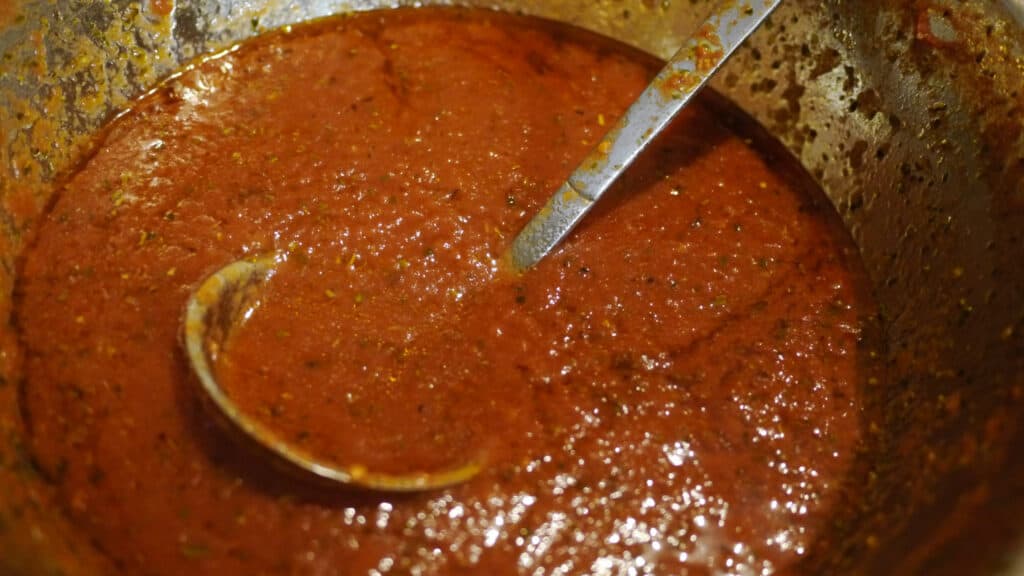
Types of Bacteria in Refrigerated Foods
There are two different families of bacteria: pathogenic bacteria, the kind that causes food-related illness, and spoilage bacteria, the kind of bacteria that causes foods to deteriorate and develop unpleasant odors, tastes, and textures.
Pathogenic bacteria can proliferate in the temperature range between 40 and 140 °F, but they do not generally affect food’s taste, smell, or appearance. In other words, one cannot tell that bacteria is present.
Spoilage bacteria can grow at low temperatures, such as in the refrigerator. Eventually, they cause food to develop bad tastes and smells. Most people would not choose to eat spoiled food, but they probably would not get sick if they did. It comes down to an issue of quality versus safety:
- Food left too long on the counter may be dangerous to eat but could look fine.
- Food that has been stored too long in the refrigerator or freezer may be of lessened quality but most likely would not make anyone sick.
Come on; no one deserves to fall sick after eating a pizza!
Refrigeration slows bacterial growth. A refrigerator set at 40°F or below will protect most foods.
So, knowing and understanding the proper food handling and storage is crucial.
Pizza Pun
So my girlfriend left a note on the fridge saying, “Sorry, this isn’t working.”
Then I opened the fridge, and it was still working.
Phew, I thought something bad is going to happen today.
How Long Does Store-Bought Pizza Sauce Last In The Fridge?
Tomato-based foods are among the favorite foods of most people. They got the right amounts of tanginess and just enough sweetness that gives a mouthful of fantastic taste and flavors.
But the sad part about these foods is that they spoil quickly due to the speedy growth of bacteria.
This spoilage becomes even more true when we talk about pizza sauce. Unlike the other sauces, pizza sauce doesn’t last long, even if you keep it in the refrigerator.
Leaving the pizza sauce on the counter will spoil the following day or maybe the evening if you live in colder places.
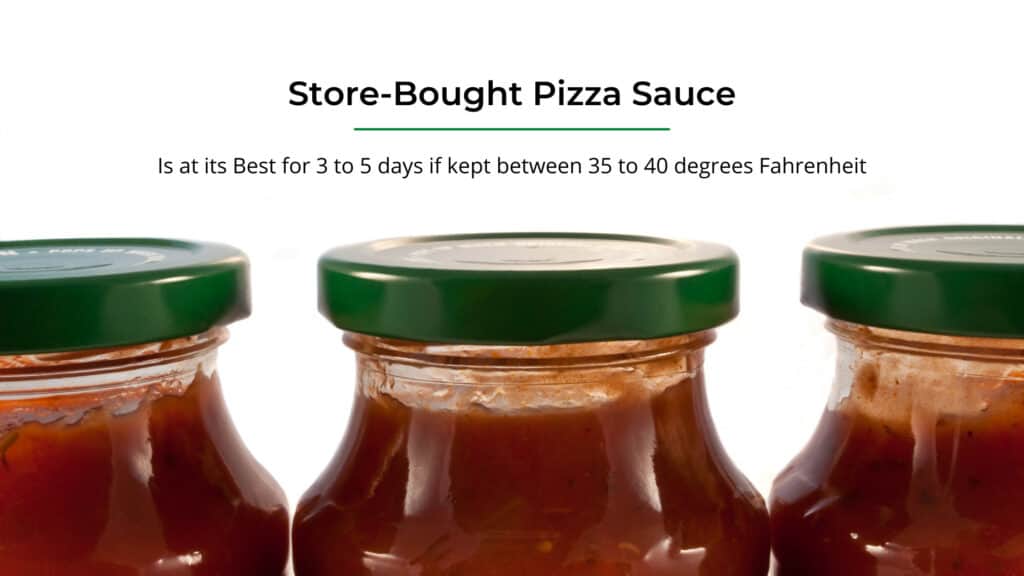
But suppose you store pizza sauce in the refrigerator. According to the USDA- Food Safety and Inspection Service, it will only last four days if the temperature is between 35 to 40 degrees Fahrenheit.
Store-bought sauces are packed with preservatives that make them last for a little longer. For this reason, some folks use the opened jar for weeks, which isn’t the right way.
Even if the sauce stays fresh due to refrigeration, it loses its flavor and quality over time. Hence, store-bought pizza sauce should be used quickly once the jar is opened.
Some popular brands claim that their pizza sauce lasts up to 2 weeks. This assumption can be accurate, but we can’t bet on the maintained quality!
How Long Does Homemade Pizza Sauce Last In The Fridge?
We always say homemade pizza is the best. It’s pure, flavorful, rustic, and, of course – made with love!
Nothing can beat homemade pizza sauce except bacteria.
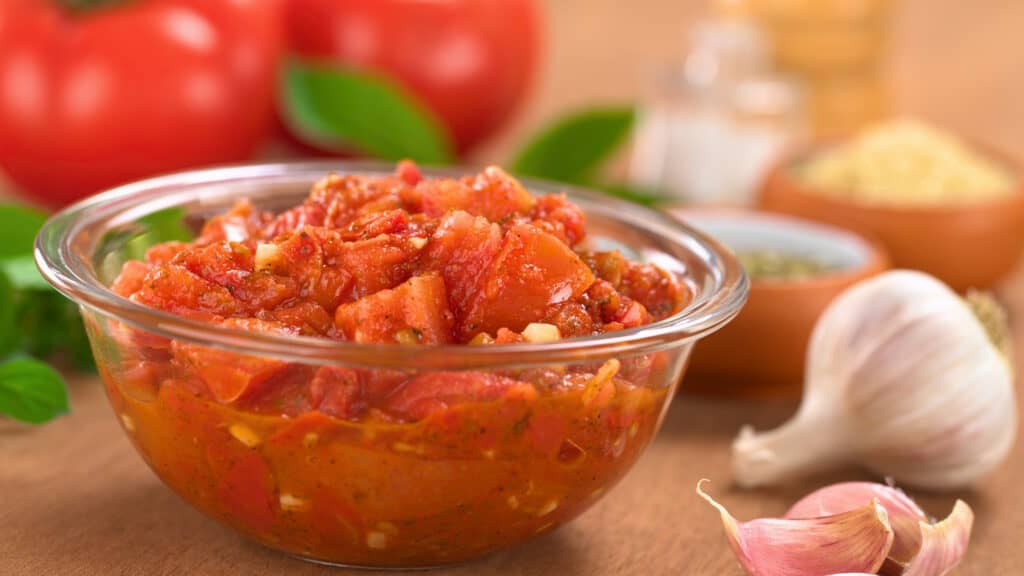
The thing is, the homemade sauce doesn’t have any added preservatives or stabilizers. Therefore, they don’t last for weeks like store-bought sauces.
Store your homemade sauce properly in the refrigerator can last for 4-7 days. However, it won’t stay as flavorful as it was on the first day.
If you have tomatoes in season or have your farm produce, you can make a large batch of sauce and freeze it. The frozen tomato pizza sauce can last up to 3-4 months!
Factors Influencing the Shelf-life of Pizza Sauce
Regarding the lifespan of pizza sauce, not all jars are created equal. Various factors can influence how long your pizza sauce will stay fresh and flavorful, and understanding these can help ensure you get the most out of every drop.
Storage Conditions
First and foremost, storage conditions play a crucial role in preserving your pizza sauce. Whether it’s store-bought or homemade, pizza sauce should always be stored in the refrigerator once opened. The cool environment slows down the growth of bacteria and mold, significantly extending the sauce’s shelf-life.
Temperature and Exposure to Air
The temperature of your fridge and the amount of air the sauce is exposed to also greatly impact the sauce’s longevity. Ideally, your refrigerator should be set at or below 40°F (4°C). Temperatures above this can allow bacteria to multiply faster, leading to quicker spoilage.
As for air exposure, every time you open the jar, you introduce new air—and with it, new bacteria. This exposure can accelerate the degradation of the sauce. It’s advisable to quickly retrieve the amount of sauce and close the jar to minimize air exposure.
Container
Lastly, the type of container you use can affect how long your pizza sauce lasts. Glass jars with airtight lids are generally the best option. They don’t absorb flavors or odors and can be easily cleaned and sterilized. Plastic containers, while convenient, can sometimes harbor bacteria in scratches and grooves, even after washing. If you’re using a plastic container, ensure it’s in good condition and thoroughly cleaned.
For the homemade sauce, ensure you use a clean container whenever you make a new batch. If you’re reusing jars from the store-bought sauce, make sure to wash and dry them thoroughly before adding the new sauce.
Remember, even the best pizza sauce can’t overcome poor storage practices. By controlling these factors, you can ensure your pizza sauce stays as fresh, tasty, and safe as possible for as long as possible. Up next, we’ll discuss how to tell when your pizza sauce has passed its prime and tips for extending its shelf-life.
How Can You Tell If Pizza Sauce Is Bad?
This section is essential to this whole post, so read it carefully.
As we have already discussed above, not everything stinks after turning bad. This is especially true in the case of pizza sauce. You might think your sauce is still fresh because it was stored in a fridge, but it gets worse even in the fridge in reality.
It won’t harbor bacteria due to cold temperatures; it will lose its taste and flavors. It will become bland over time.
If you’ve stocked up your sauce for quite some time, it’s very important to check it before using it on your pizzas. Below are a few ways to check if a pizza sauce has gone bad :
Appearance
The fastest way to check if the pizza sauce has gone bad is by looking at it. Simply open up your jar and look for the signs of mold. If there are greenish and whitish mold spores on the sauce’s surface and the lid of the container, you must discard it. You won’t see this if your sauce is kept in the fridge.
Smell
Open your sauce can and give it a good sniff to see if it’s in the proper condition or not. If you notice any unpleasant and musty odor, then know that your sauce has turned and can’t be used.
Taste
This is mainly to check if the sauce is kept in the refrigerator for too long. Just give it a taste and see if it is still flavorful. Generally, such sauces become bland after being kept for longer. So, avoid using a stale sauce and grab a fresh jar if you want your pizza to taste divine!

How To Properly Store Pizza Sauce In The Fridge?
Storing the pizza sauce correctly is very important if you want it to retain its flavors as long as it is in the fridge. So, here we are with our guide to storing pizza sauce correctly!
Storing Store-bought Pizza Sauce
- Clean the jar nicely using a dry tissue for storing the store-bought pizza sauce left after one use. Again, leave some space on the jar’s top by taking the seal tightly.
- Put the lid and seal it tightly.
- Please place it in the fridge and use it within 3 to 4 days.
So, this was about storing the pizza sauce in the refrigerator. You can also freeze the tomato sauce and use it for up to 4-5 months. For more on this, you can check our article on freezing pizza sauce.
Storing Homemade Pizza Sauce
Let it cool down entirely if you’ve prepared a homemade pizza sauce using natural ingredients and no preservatives.
Meanwhile, prepare your glass jar with an airtight lid. Ensure to wash the jar and dry it thoroughly before adding the sauce. A single droplet of water may ruin your delicious sauce. So, be very careful.
Once the jar is nice and dry:
- Fill in your homemade pizza sauce. Never fill the jar up to the rim; fill it slightly more than half. There should be some space for airflow.
- Put the lid on and keep it in the fridge at a constant temperature.
You can store it for up to 3 to 5 days. If you want to stretch it a bit, ensure you don’t exceed 6 days.
Freezing Pizza Sauce
There are three ways to freeze pizza sauce: freezing the jars, making pizza sauce cubes, and freezing in ziplock bags.
Here is how you can do this :
- If you want to freeze the sauce in the jars, choose good-quality jars with an airtight lid. Clean and dry them completely and fill the sauce up to 90% of its capacity. Close the lid and keep it inside the freezer at a constant temperature.
- To freeze in freezer bags, portion the sauce in the desired amount and put it inside clean freezer bags. Remove the air and seal them tightly before throwing them into the freezer.
- Finally, to make your sauce cubes set them in a clean ice tray or muffin tray and keep them in the freezer.
If you want to learn more about freezing pizza sauce, don’t forget to check our article Useful Insights for Keeping Pizza Sauce in the Freezer.
How To Properly Use Pizza Sauce That Has Been In The Fridge
- To use the refrigerated pizza sauce, take out the container and use a clean and dry spoon to scoop out enough amount to use. After that, keep the rest inside the fridge without leaving it out for longer.
- To use the frozen pizza sauce, you’ll need to defrost it first. To use the jars and bags, put them in the refrigerator for an hour, and after then, take the sauce out using a spoon and put the rest back inside the freezer. Using the sauce cubes is easy’ take the desired number of cubes and melt them using a microwave.
Recommended Pizza Sauce Storage Containers
Embarking on the quest for the perfect pizza sauce storage might seem trivial, but the right container can be the knight in shining armor that protects your sauce from early spoilage. Let’s dive into the world of containers and unveil the champions of pizza sauce preservation.
Rubbermaid Brilliance 100% leak-proof food storage containers feature BPA-free Tritan lids and bases with 360-degree clarity; airtight seal and secure latches prevent spills and leaks and help keep food fresh and secure
The Last Slice
Pizza sauce is the most critical ingredient for making a next-level pizza. So, it’s imperative to maintain its quality. We have discussed how you can store it properly and how you can keep it inside your fridge to make a delicious pizza every time you use it.
We are confident that this guide will help you preserve your pizza sauce and become the best pizza baker!
Did we miss anything? How do you like to store your pizza sauce? Let us know; we would love to know.
Additional Resources

Homemade Pizza Sauce: Crafting the Perfect Blend
the PROs
You know that dreamy moment when you take a bite of pizza and the world just stops? When all the …
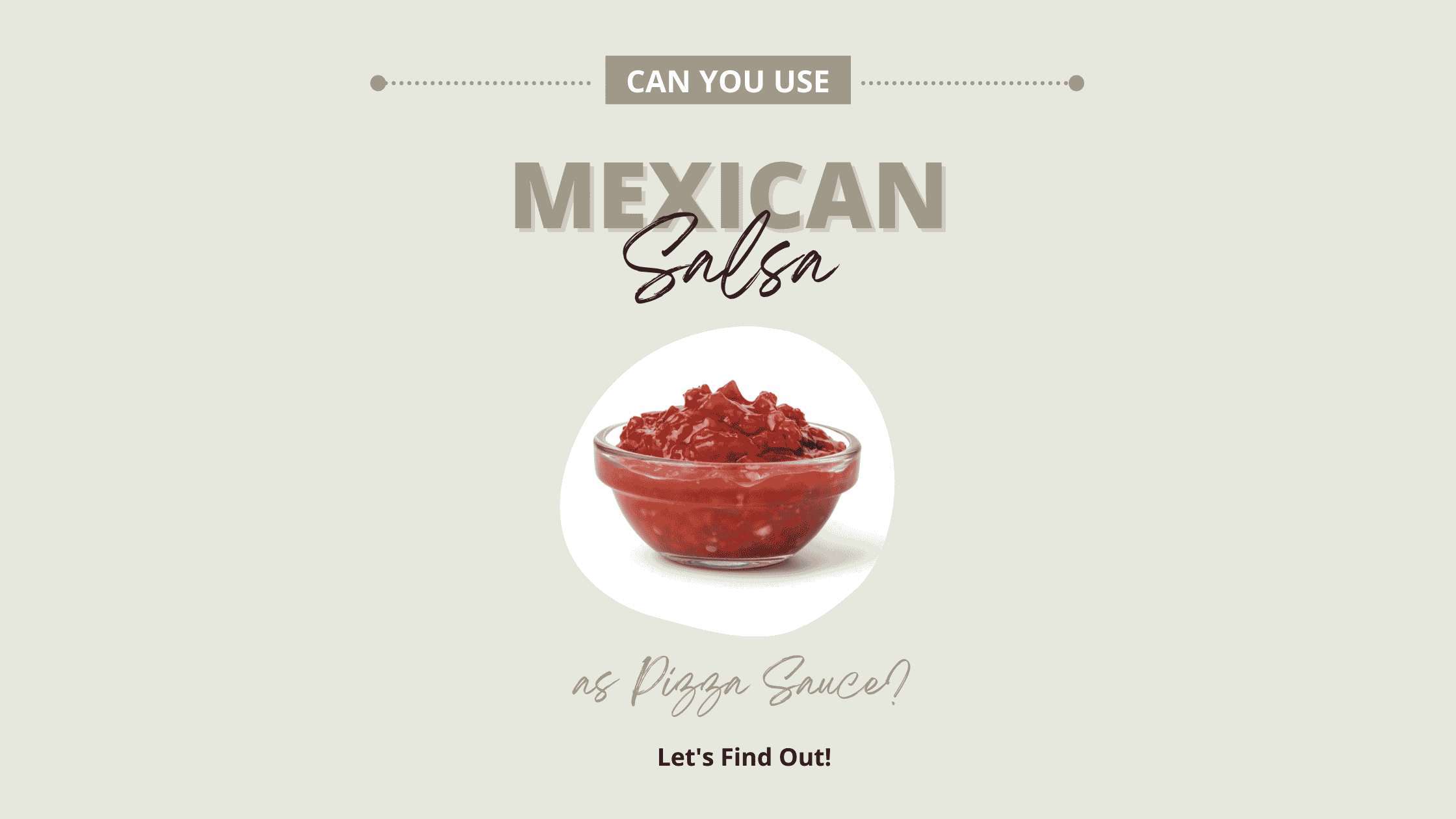
Can You Use Salsa as Pizza Sauce? Here’s Everything You Need to Know
the PROs
Using Salsa as a Pizza Sauce Are you wondering if you can use salsa as a pizza sauce? Yes, you …
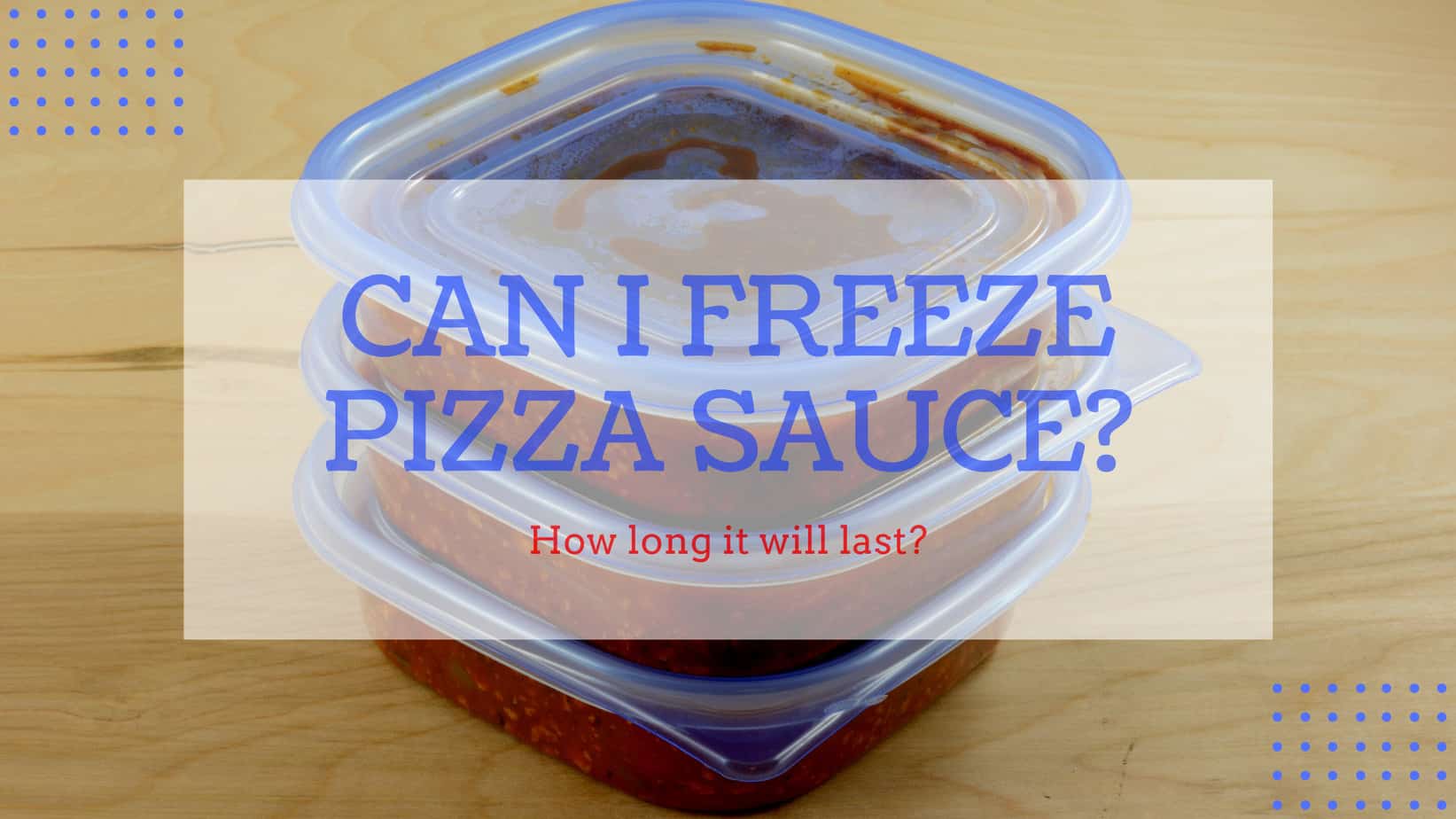
Can You Freeze Pizza Sauce? Here’s What You Need to Know
the PROs
So, it is evidently clear that you can store your pizza in the freezer. But how about the pizza sauce? Can you freeze pizza sauce as well in the freezer? In this piece, you will discover more about pizza sauce and how it can be stored in the freezer. Let’s dive in.
Enjoy!
Not a PRO? Not a Problem!
Take a pizza class to bring your pizza skills to the next level,
so you can be a PRO!
Related Posts

Costco Pizza Delivery: Find How You Can Get It Now!
the PROs
People go to Costco’s food court for many different reasons, but the cheesy slice of pizza they serve is among …

Pizza for Beginners: Don’t Buy Pizza, Make It! Here’s How to Get Started!
the PROs
You have this idea that you want to make pizza at home as opposed to ordering it, but where do you start? Don’t worry! Here you will find answers and directions to all your questions.

Pizza Toppings Under Cheese or Over Cheese? [Why the Order Matters]
the PROs
Is Pizza Cheese on Top or Bottom? Hey pizza lovers, are you wondering if you should layer pizza toppings under …
Newsletter
Subscribe to our Recipe of the Week newsletter and receive our partners’ latest recipes, tips, and discount offers.
Keep in Touch!
